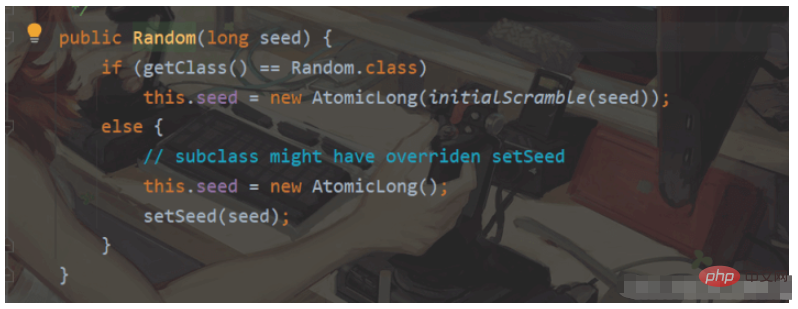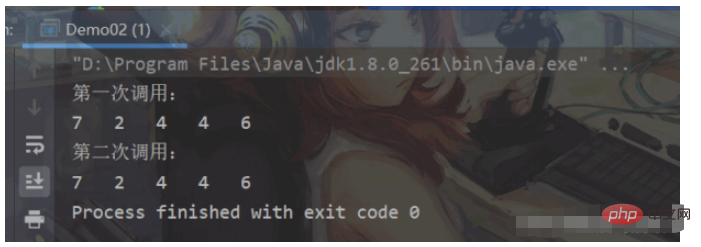How to solve the seed problem in Java Random class
It can be said that in current computer languages and ordinary users, there is no way to obtain true random numbers. True random numbers are now only available in quantum computers.
So the random numbers we are talking about now can also be called pseudo-random numbers. Pseudo-random numbers are the result obtained through an algorithm and combined with the next regularly changing number (such as time).
We call this data that is collected through algorithm time as the basis for initially obtaining random numbers as a seed.
There are two ways to create random numbers in Java:
The first is to directly create a Random object
Random random = new Random();
This method will be called at the bottom to get the seed :

The second is to pass the seed you created:
Random random = new Random(5);

In the source code we can directly It can be seen that the data type of the seed is long, which is a long integer.
So we now have a way to get the seed it generates when it first generates a Random object, and then pass the obtained seed into the object that created the Random. Is it possible to obtain the same random number as above?
First use the java language to implement it:
import java.util.Random;
public class Demo02 {
public static void main(String[] args) {
Random random = new Random(5);//在这将5作为种子传入
System.out.println("第一次调用:");
for (int i = 0; i < 5; i++) {
System.out.print(random.nextInt(10) + "\t");
//获得10以内的随机数(不包括10)
}
random.setSeed(5);//在这再将种子5传入Random的种子当中
System.out.println("\n第二次调用:");
for (int i = 0; i < 5; i++) {
System.out.print(random.nextInt(10) + "\t");
}
}
}
It is obvious from here that this random number is not random at all. As long as the seed is the same twice, the same result will be returned.
Here I use python language to implement this function again (mainly because there is no method in Java that can call the output of the current seed). Use python to have a better understanding.
In python, I will write more detailed comments. The details will not be difficult to understand.
import random #导入random内库
x = random.getstate() # 获得当前random里的种子
print('第一次循环:') #输入语句
for i in range(5):
#for循环 for i in range(5) ===》 for (int i = 0; i < 5; i++)
#在python里面并没哟什么大括号去吧什么括起来,而是要注意锁定,一个锁定就是一个整体
print(random.randint(1, 10), end='\t')
#random.randint(1, 10)生成1~10(不包括10)的随机数,
# end='\t'表示当前print没有结束,还有一个制表符的键位,也就不换行了
print('\n第二次循环')
random.setstate(x)#将上面获得的种子再次传入进去
for i in range(5): #这里和上面一样,循环出5次
print(random.randint(1, 10), end='\t')
The above is the detailed content of How to solve the seed problem in Java Random class. For more information, please follow other related articles on the PHP Chinese website!

Hot AI Tools

Undresser.AI Undress
AI-powered app for creating realistic nude photos

AI Clothes Remover
Online AI tool for removing clothes from photos.

Undress AI Tool
Undress images for free

Clothoff.io
AI clothes remover

Video Face Swap
Swap faces in any video effortlessly with our completely free AI face swap tool!

Hot Article

Hot Tools

Notepad++7.3.1
Easy-to-use and free code editor

SublimeText3 Chinese version
Chinese version, very easy to use

Zend Studio 13.0.1
Powerful PHP integrated development environment

Dreamweaver CS6
Visual web development tools

SublimeText3 Mac version
God-level code editing software (SublimeText3)

Hot Topics
 Perfect Number in Java
Aug 30, 2024 pm 04:28 PM
Perfect Number in Java
Aug 30, 2024 pm 04:28 PM
Guide to Perfect Number in Java. Here we discuss the Definition, How to check Perfect number in Java?, examples with code implementation.
 Weka in Java
Aug 30, 2024 pm 04:28 PM
Weka in Java
Aug 30, 2024 pm 04:28 PM
Guide to Weka in Java. Here we discuss the Introduction, how to use weka java, the type of platform, and advantages with examples.
 Smith Number in Java
Aug 30, 2024 pm 04:28 PM
Smith Number in Java
Aug 30, 2024 pm 04:28 PM
Guide to Smith Number in Java. Here we discuss the Definition, How to check smith number in Java? example with code implementation.
 Java Spring Interview Questions
Aug 30, 2024 pm 04:29 PM
Java Spring Interview Questions
Aug 30, 2024 pm 04:29 PM
In this article, we have kept the most asked Java Spring Interview Questions with their detailed answers. So that you can crack the interview.
 Break or return from Java 8 stream forEach?
Feb 07, 2025 pm 12:09 PM
Break or return from Java 8 stream forEach?
Feb 07, 2025 pm 12:09 PM
Java 8 introduces the Stream API, providing a powerful and expressive way to process data collections. However, a common question when using Stream is: How to break or return from a forEach operation? Traditional loops allow for early interruption or return, but Stream's forEach method does not directly support this method. This article will explain the reasons and explore alternative methods for implementing premature termination in Stream processing systems. Further reading: Java Stream API improvements Understand Stream forEach The forEach method is a terminal operation that performs one operation on each element in the Stream. Its design intention is
 TimeStamp to Date in Java
Aug 30, 2024 pm 04:28 PM
TimeStamp to Date in Java
Aug 30, 2024 pm 04:28 PM
Guide to TimeStamp to Date in Java. Here we also discuss the introduction and how to convert timestamp to date in java along with examples.
 Java Program to Find the Volume of Capsule
Feb 07, 2025 am 11:37 AM
Java Program to Find the Volume of Capsule
Feb 07, 2025 am 11:37 AM
Capsules are three-dimensional geometric figures, composed of a cylinder and a hemisphere at both ends. The volume of the capsule can be calculated by adding the volume of the cylinder and the volume of the hemisphere at both ends. This tutorial will discuss how to calculate the volume of a given capsule in Java using different methods. Capsule volume formula The formula for capsule volume is as follows: Capsule volume = Cylindrical volume Volume Two hemisphere volume in, r: The radius of the hemisphere. h: The height of the cylinder (excluding the hemisphere). Example 1 enter Radius = 5 units Height = 10 units Output Volume = 1570.8 cubic units explain Calculate volume using formula: Volume = π × r2 × h (4
 PHP vs. Python: Understanding the Differences
Apr 11, 2025 am 12:15 AM
PHP vs. Python: Understanding the Differences
Apr 11, 2025 am 12:15 AM
PHP and Python each have their own advantages, and the choice should be based on project requirements. 1.PHP is suitable for web development, with simple syntax and high execution efficiency. 2. Python is suitable for data science and machine learning, with concise syntax and rich libraries.






